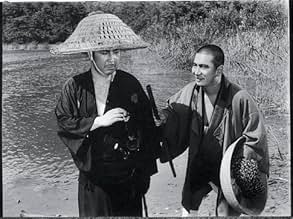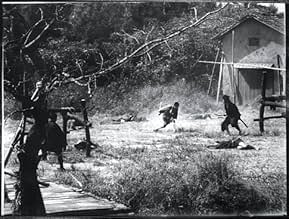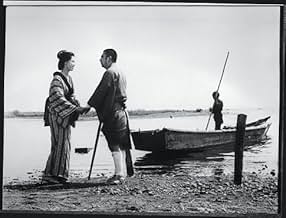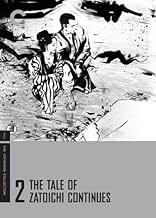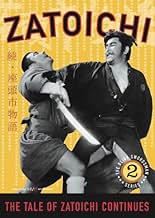IMDb-BEWERTUNG
7,2/10
2943
IHRE BEWERTUNG
Füge eine Handlung in deiner Sprache hinzuThe blind masseur and swordsman, Zatoichi, learns of a powerful political figure's secret and is quickly tailed by a group of killers.The blind masseur and swordsman, Zatoichi, learns of a powerful political figure's secret and is quickly tailed by a group of killers.The blind masseur and swordsman, Zatoichi, learns of a powerful political figure's secret and is quickly tailed by a group of killers.
- Regie
- Drehbuch
- Hauptbesetzung
Yaeko Mizutani
- Setsu
- (as Yoshie Mizutani)
Tomisaburô Wakayama
- Nagisa no Yoshiro
- (as Jô Kenzaburô)
Empfohlene Bewertungen
Return of Masseur Ichi, The (1962)
*** (out of 4)
Blind masseur Zatoichi (Shintaro Katsu) discovers the weakness of a lord and must fight off various assassins who fear he will give away that secret. This was a pretty interesting samurai film from director Kazuo Mori, which relies a lot on fantasy but most of all is just all action and nice swordplay. Katsu makes for a wonderful lead and the supporting roles are filled nicely. The cinematography stretched out the full 2.35:1 looks incredibly sharp and the fights are well staged even though I have a somewhat hard time seeing a blind person doing all that.
*** (out of 4)
Blind masseur Zatoichi (Shintaro Katsu) discovers the weakness of a lord and must fight off various assassins who fear he will give away that secret. This was a pretty interesting samurai film from director Kazuo Mori, which relies a lot on fantasy but most of all is just all action and nice swordplay. Katsu makes for a wonderful lead and the supporting roles are filled nicely. The cinematography stretched out the full 2.35:1 looks incredibly sharp and the fights are well staged even though I have a somewhat hard time seeing a blind person doing all that.
With continuity directly linking it with its immediate predecessor ( released only five months and three weeks prior ) , and also holding a perfect 100 percent score on rotten tomatoes, this beautifully photographed ( in high contrast black and white, like its predecessor ) Zatoichi film is as good as that film was, even if the end scene is too abrupt, although it also shows just how quickly and efficiently Zatoichi fights. A double-edged sword, pun completely intended.
Hypnotically beautiful looking, I could easily tune out the plot, and just enjoy the visuals, and impressive swordplay. Sadly though, this second film is also the final film in this series to be shot in black and white, as the numerous continuation films were in colour.
Hypnotically beautiful looking, I could easily tune out the plot, and just enjoy the visuals, and impressive swordplay. Sadly though, this second film is also the final film in this series to be shot in black and white, as the numerous continuation films were in colour.
Roughly a year after his first run-in with the shady Yakuza types of small-town Japan, a notorious blind swordsman blows back into town seeking an encore. Actually, the hopeful pacifist Zatoichi is merely interested in paying his respects at the grave of a fallen comrade, the honorable samurai he out-dueled last time, but the shadier denizens of this corrupt village have long memories and see his visit as an opportunity for revenge.
While that drama plays out, Ichi makes enemies with a misbehaving prince, befriends a trio of prostitutes and crosses paths with another acquaintance: a one-armed former romantic rival who still carries a grudge. The latter is portrayed by Tomisaburo Wakayama, later known for his lead role in the Lone Wolf and Cub films (and star Shintaro Katsu's real-life brother), which makes his eventual duel with Ichi doubly interesting as a sort of unofficial pre-crossover. Not for the last time, either, as 1970 would produce a match between our blind protagonist and Toshirô Mifune's Yojimbo... but that's a topic for another time.
As The Tale Continues is concerned, I found it a mild step down from the first film. There's more action this time, and a much faster pace, but the additional subplots make for a less focused narrative and drain power from the larger developments and reveals of the third act. Another outstanding performance from Katsu, though, and wow, what a final shot!
While that drama plays out, Ichi makes enemies with a misbehaving prince, befriends a trio of prostitutes and crosses paths with another acquaintance: a one-armed former romantic rival who still carries a grudge. The latter is portrayed by Tomisaburo Wakayama, later known for his lead role in the Lone Wolf and Cub films (and star Shintaro Katsu's real-life brother), which makes his eventual duel with Ichi doubly interesting as a sort of unofficial pre-crossover. Not for the last time, either, as 1970 would produce a match between our blind protagonist and Toshirô Mifune's Yojimbo... but that's a topic for another time.
As The Tale Continues is concerned, I found it a mild step down from the first film. There's more action this time, and a much faster pace, but the additional subplots make for a less focused narrative and drain power from the larger developments and reveals of the third act. Another outstanding performance from Katsu, though, and wow, what a final shot!
Never mind the first film to take its time in introducing the character to us, of which I am glad that it didn't rush. Now that we and the others in the film "know" him ( although part of the fun is that nobody is really able to know him and his skill really) the film goes to hyperdrive mode straightaway.
It's fascinating to see this in retrospect, knowing it is a long franchise, and trying to map out the development and where the film and its success came from. Inthink the first film is strong because it takes its time in creating its own universe, simply so that the sequels don't have to work so hard in setting things up. It's nice, and so is the self-reference it allows both in humour and mythology, but the films quickly morph into each other. It doesn't seem to be a problem here, since aren't all series all about working for or against the set rules and archetypes in the previous films?
Anyway, I think the two films have very well set up Zatoichi's blindness as a metaphor, yet it's the first film that's more ambitiously conceived. In this respect these two first films are like "Yojimbo" and "Sanjuro", Kurosawa's duology. The last shot of this film, however, is one of the coolest film moments I know of. Seriously. That last five seconds.
It's fascinating to see this in retrospect, knowing it is a long franchise, and trying to map out the development and where the film and its success came from. Inthink the first film is strong because it takes its time in creating its own universe, simply so that the sequels don't have to work so hard in setting things up. It's nice, and so is the self-reference it allows both in humour and mythology, but the films quickly morph into each other. It doesn't seem to be a problem here, since aren't all series all about working for or against the set rules and archetypes in the previous films?
Anyway, I think the two films have very well set up Zatoichi's blindness as a metaphor, yet it's the first film that's more ambitiously conceived. In this respect these two first films are like "Yojimbo" and "Sanjuro", Kurosawa's duology. The last shot of this film, however, is one of the coolest film moments I know of. Seriously. That last five seconds.
This movie is, I guess, the first of the very long & very excellent zato-ichi series starring the incomparable Shintaro Katsu who also starred in the shorter but every bit as impressive if quite different series: The Razor. I lived in San Francisco in the 1960s & 1970s & used to go watch these films every week at the Japanese theater in the old "Japan Town". Loved them then, love them now. This film in particular is a classic in every way: cinematographically it looks like Eisenstein - every shot a classic. The compositions, textures & tonalities are breathtakingly beautiful. Dramatically, it's every bit as gripping as Yojimbo or the best Ford westerns (e.g. Stagecoach). And finally the sword-fight choreography - None better. Terrific movie!
Wusstest du schon
- WissenswertesThe Tale of Zatoichi proved to be so popular that this sequel went into production the same year, 1962.
- VerbindungenFeatured in Best in Action: 1962 (2018)
Top-Auswahl
Melde dich zum Bewerten an und greife auf die Watchlist für personalisierte Empfehlungen zu.
- How long is The Tale of Zatoichi Continues?Powered by Alexa
Details
- Erscheinungsdatum
- Herkunftsland
- Sprache
- Auch bekannt als
- Zatoichi 2: The Tale of Zatoichi Continues
- Produktionsfirma
- Weitere beteiligte Unternehmen bei IMDbPro anzeigen
- Laufzeit
- 1 Std. 12 Min.(72 min)
- Farbe
- Sound-Mix
- Seitenverhältnis
- 2.35 : 1
Zu dieser Seite beitragen
Bearbeitung vorschlagen oder fehlenden Inhalt hinzufügen

